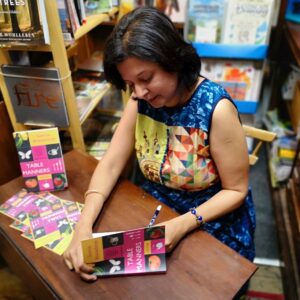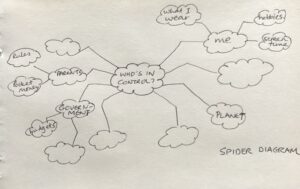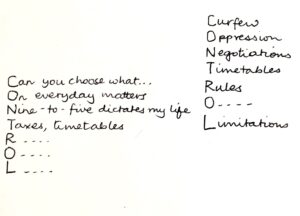We asked four professional writers to create resources to help guide entrants through the process of researching, finding a form, starting to write and responding to feedback on an entry to the Orwell Youth Prize.
I’m Susmita Bhattacharya, a writer of fiction, non-fiction and poetry. I’ve written a novel, The Normal State of Mind, and a collection of short stories, Table Manners. I also teach creative writing to writers from the age of 7 to those doing their Masters in Creative Writing at university.
 When I was in school, I loved writing and creating handwritten storybooks as gifts for my friends. I also entered several writing competitions and even won a couple of times. Writing has always been my passion and it’s something I enjoy doing immensely. Once you get the idea for your piece, the flow of writing can come quite easily. But how does one start? What happens when you’re faced with a blank page or screen?
When I was in school, I loved writing and creating handwritten storybooks as gifts for my friends. I also entered several writing competitions and even won a couple of times. Writing has always been my passion and it’s something I enjoy doing immensely. Once you get the idea for your piece, the flow of writing can come quite easily. But how does one start? What happens when you’re faced with a blank page or screen?
So shall we start at the very beginning? If you have a blank page or screen in front of you, quickly do a doodle in a corner, or type the title of what you’re planning to write. The page doesn’t look so blank anymore.
The film actor, Octavia Spencer, said, “the hardest thing about writing, for me, is facing the blank page.” But also, novelist Irvine Welsh says that he “enjoys the freedom of the blank page.”
“A blank page,” according to AA Patawaran, writer and lifestyle editor, “is no empty space. It is brimming with potential… It is a masterpiece in waiting – yours.” I love that idea of the masterpiece, but I think that comes after several drafts and rewriting. At the moment, I would focus on it brimming with potential. But yes, it is a masterpiece in waiting, and you won’t know that until you’ve written something down.
If you think about any activity we do, like sports, karate, dance or even singing in the school drama production, we need to begin with a warmup. Get those muscles into gear for the best performance they can achieve. We start with simple movement and then build up with more exercises so that our muscles are nice and ready for the final job. In the same way, a warmup activity to help us going with writing is also a very good way to get those creative juices flowing. It is called free-writing, and it also helps tackle the issue of the blank page.
Free Writing – Group Exercises for the Classroom
There are many ways to do free-writing and here is one suggestion. In class, you could make a list of songs that talk about control and power in some way. For example, We are the Champions by Queen, Control by Janet Jackson, Roar by Katy Perry or The Power by Snap (great club classic from when I was a teen!) You could listen to the song or watch the video. And then choose one of the titles in the list and free write for 7 minutes how you would interpret the title or the lyrics, or the meaning of the song. Then you could carry on to your thoughts and ideas following on from the song title or lyrics.
You could also play a little game as a warmup. You will need a ball and each group sits in a circle, and a scribe (can change scribes halfway through the game so that everyone gets a chance to play it). One person throws the ball (gently!) to someone in their group and asks, Who’s in Control? They answer with the first thing that comes to their mind. The scribe makes a note of who gave what as an answer. This game would help you explore what’s going on in your subconscious mind.
Later, you could think about the words or themes that came out in the game and discuss it in pairs to see where these ideas could go.
Spider Diagrams and Acrostic Poems
Another way to tackle the blank page is to create a visual – like a spider diagram or a mind map. It can work for any genre or form of writing, like poetry, fiction, nonfiction. In the centre of your page or screen, draw a cloud and write: Who’s in Control? in the centre of it. Now create lines, or spider legs, coming out form the centre, each line an idea or a theme, or an image of what the theme means to you. Then, for each of these words attached to the spider legs, create another bubble. Expand on the ideas of some of the words which jump out at you. You can follow a line of thought until you get a connection, an idea you feel enthusiastic to explore.
If you’re planning on writing a poem, you could begin with writing an acrostic poem. Maybe choose the word CONTROL. Or, WHO’S IN CONTROL. Write it down vertically and begin each line with the letter on the corresponding line. And you already have a framework to explore your ideas. Your final poem may not be an acrostic poem, but this could be a way to start thinking about it. This could also work for a short story or an essay. You could think of key words in the form of an acrostic and you may find a word leads on to an idea, or more words that lead to something you could expand on.
George Orwell explored the themes of control and manipulation and how it could mess with a person’s identity and freedom. Think of some of the ways someone or something can control another – the weather, money, the sun, medication, laws, rules – and see where you go from there. Write what you believe in, and the blank page won’t be a challenge anymore.
I’d like to wish you all the best with your writing and end with Orwell’s quote that ‘good prose is like a windowpane’ – transparent to the reader and reflecting meaning without the smears of poor construction or the cloudiness of jargon.
Believe in yourself and believe in the masterpiece that is waiting in the wings. Good luck!
Thank you for reading this resource. We hope you enjoyed it and that it comes in useful as you write your entry to the Orwell Youth Prize! If you have any feedback on our resources, please email info@orwellfoundation.com.
Susmita Bhattacharya won the Winchester Writer’s Festival Memoir Prize in 2016 and her novel, The Normal State of Mind (Parthian/Bee Books) was longlisted for the Words to Screen Prize at the Mumbai Association of Moving Images (MAMI) festival in India. She has been shortlisted for, and won, numerous prizes and awards and her work has been commissioned by magazines and for BBC Radio 4.
The commission of these resources was supported using public funding by the National Lottery through Arts Council England as part of the Orwell Foundation’s Regional Hubs project.


